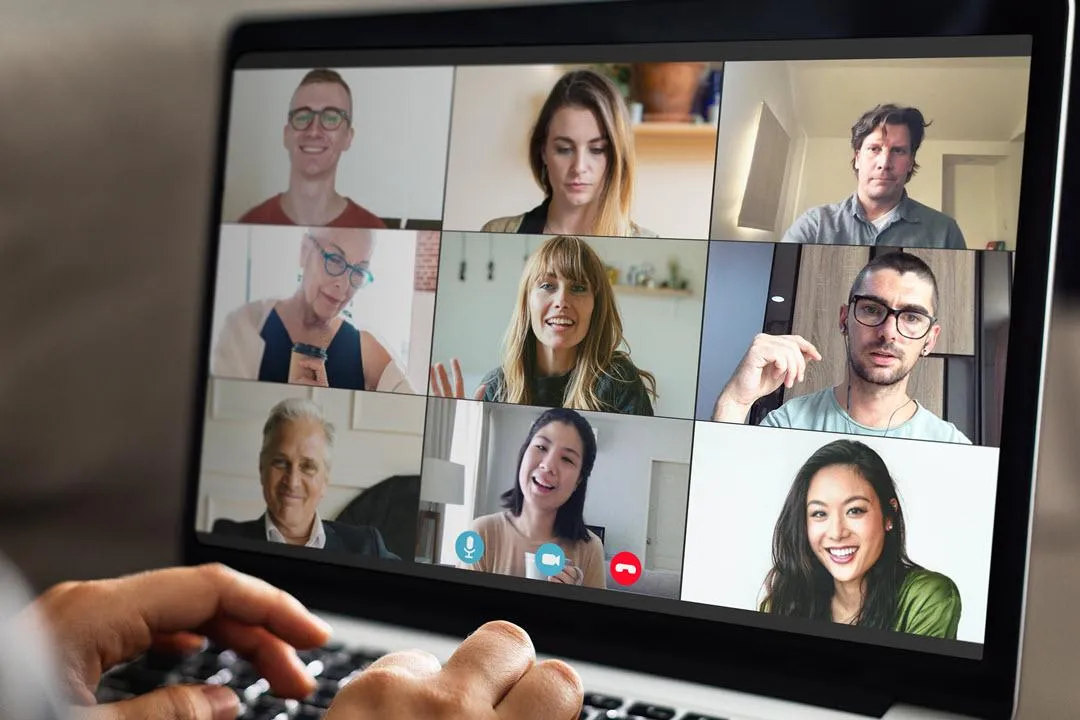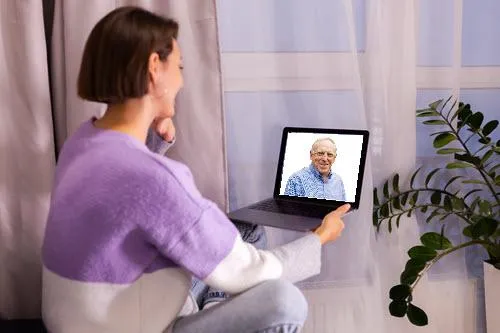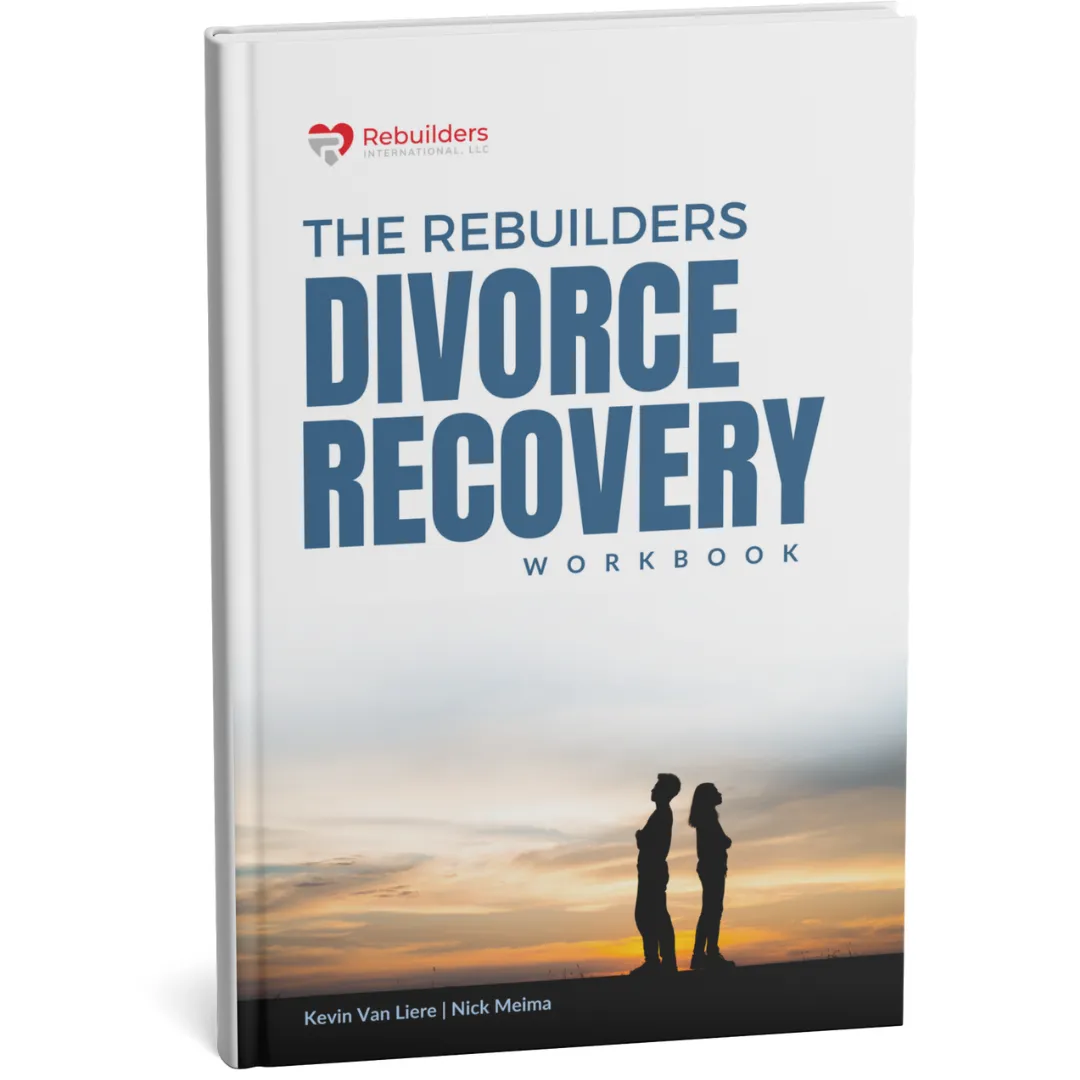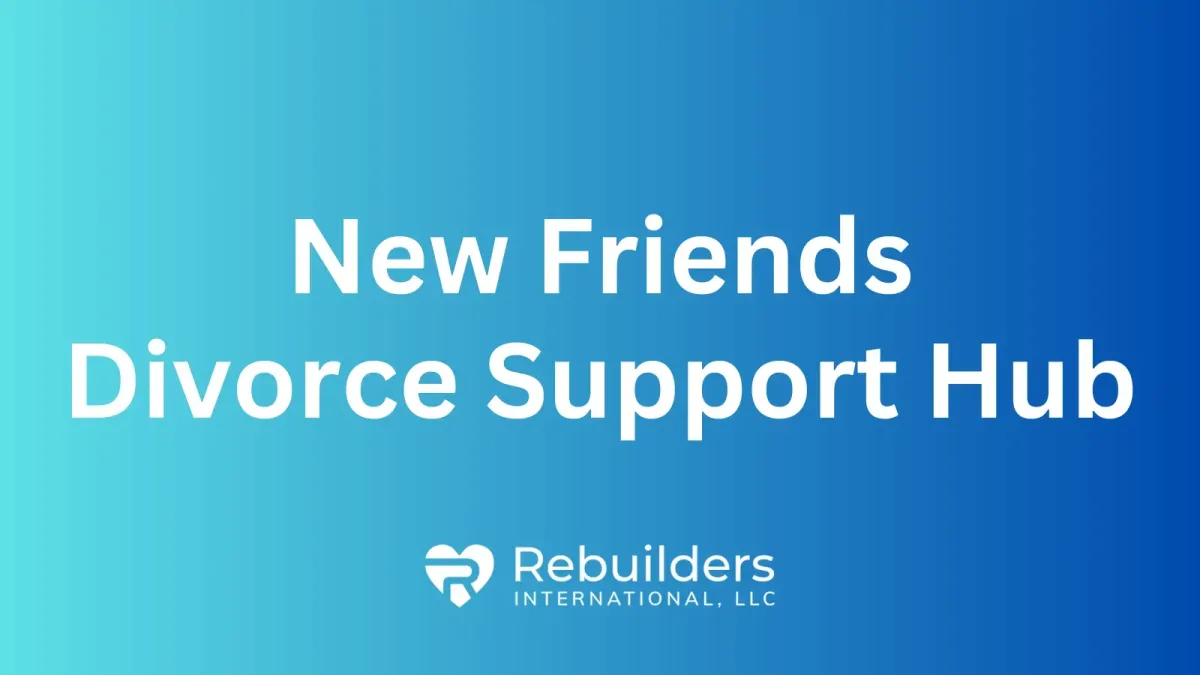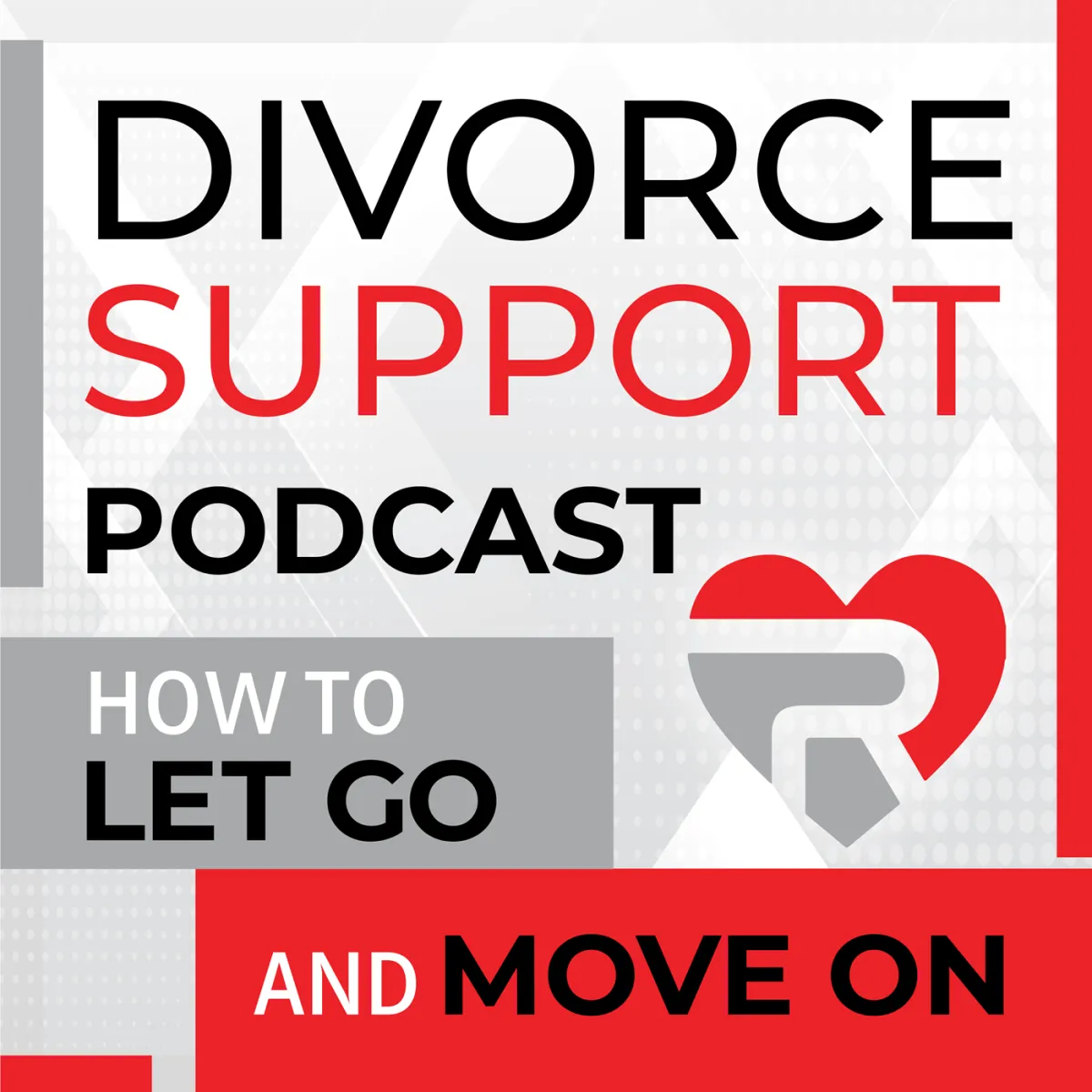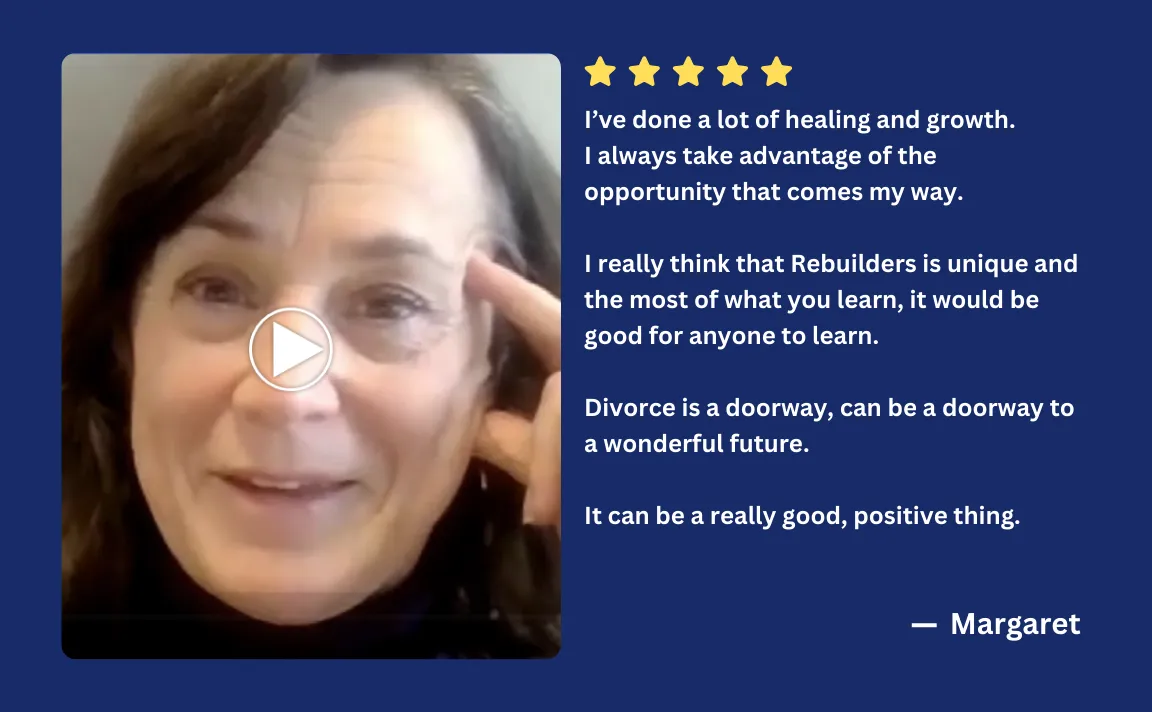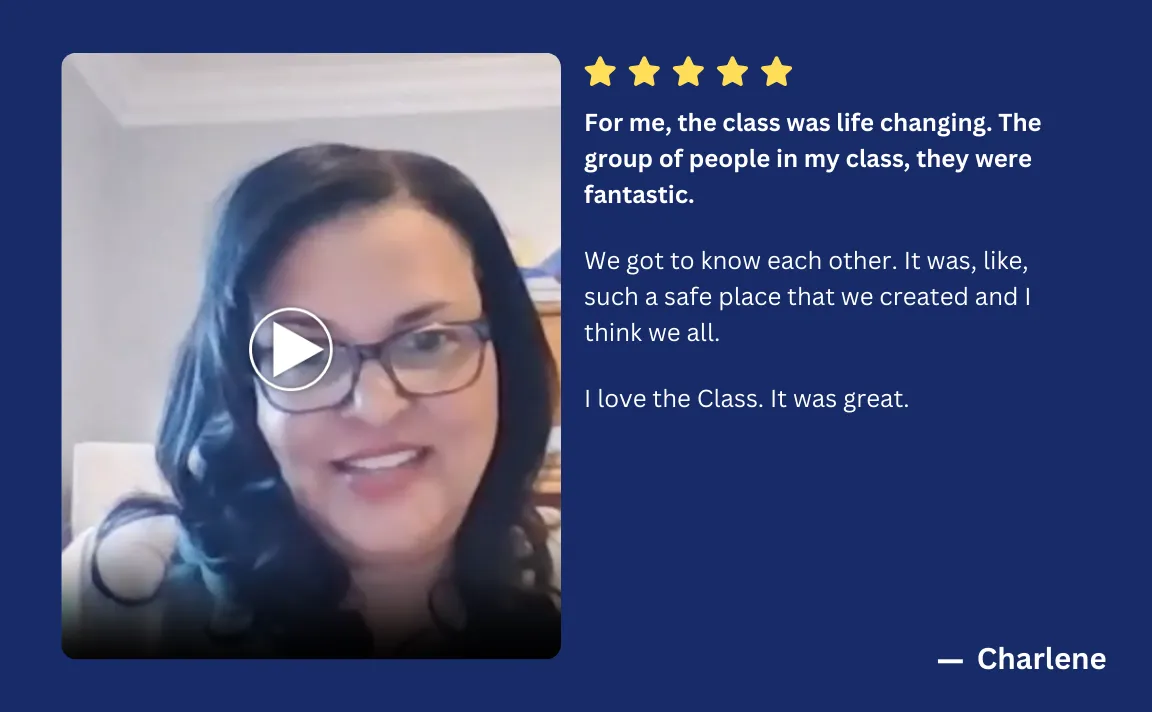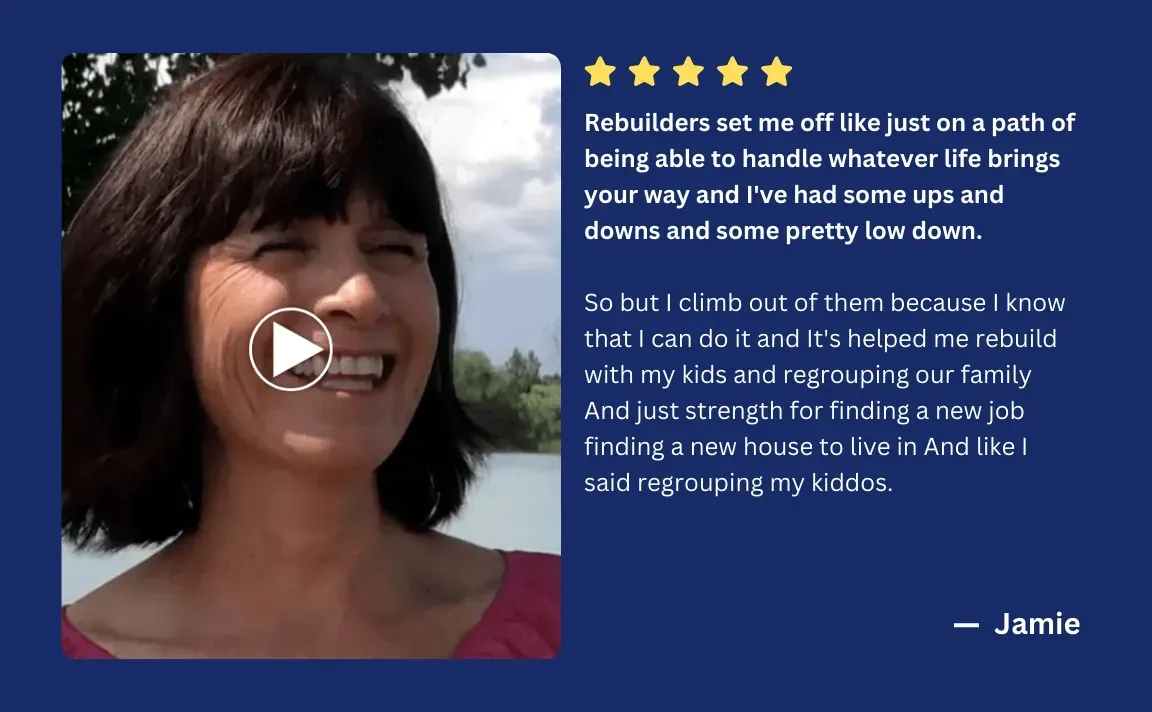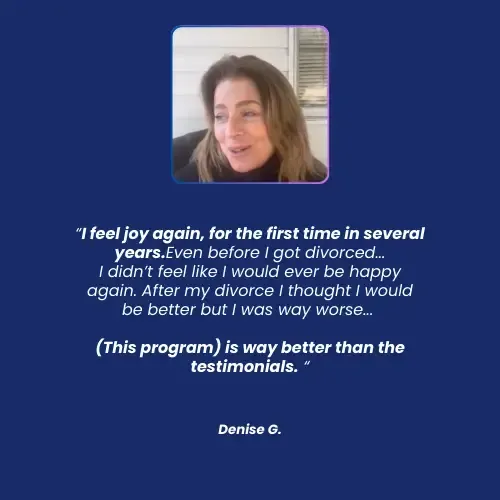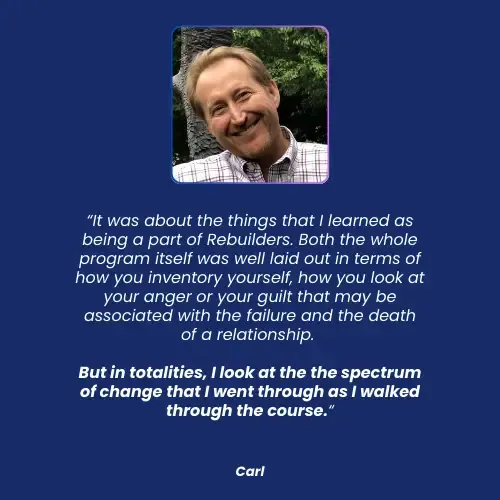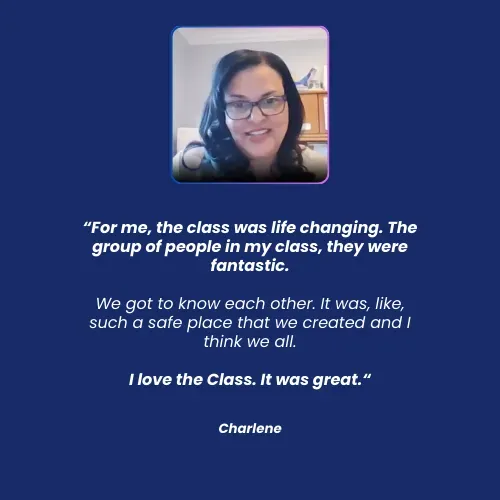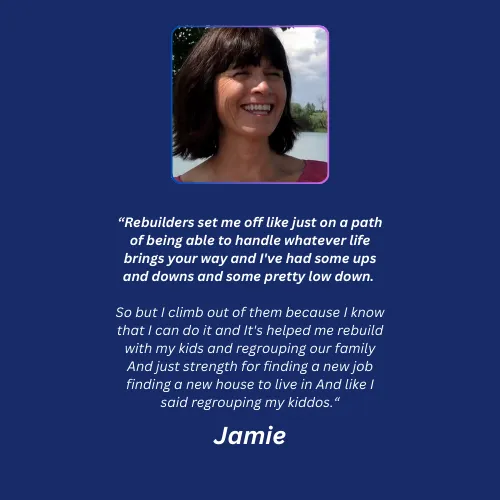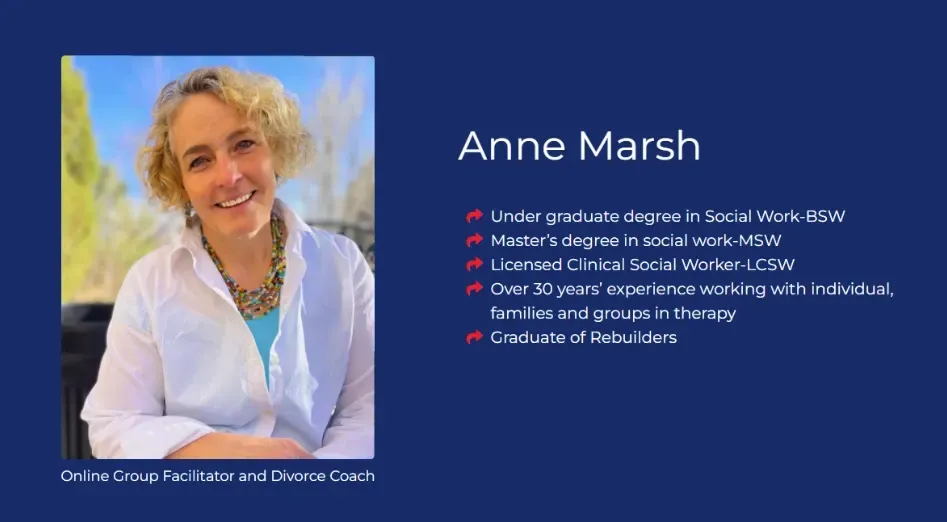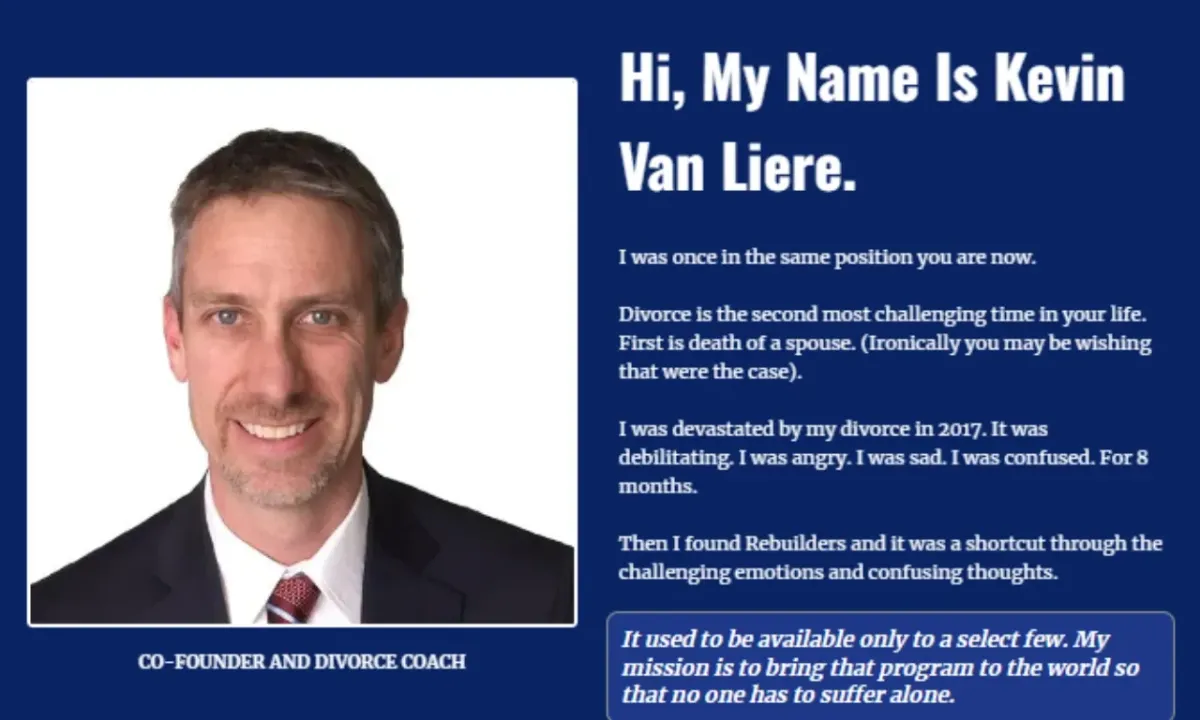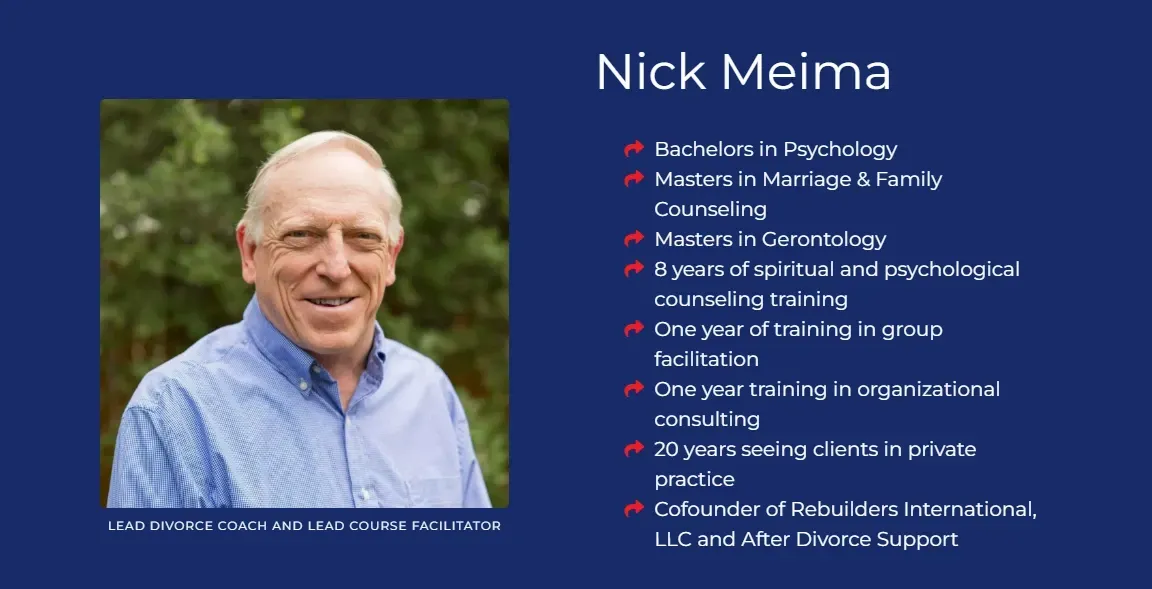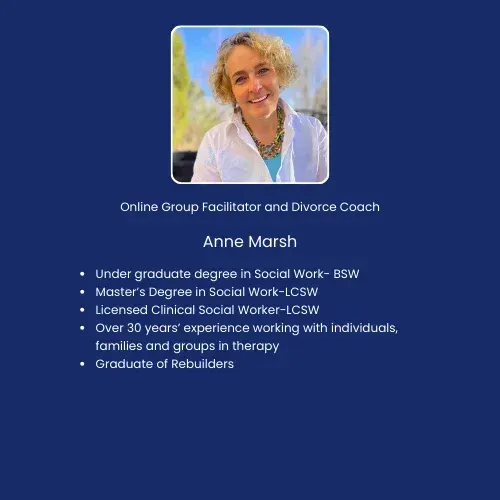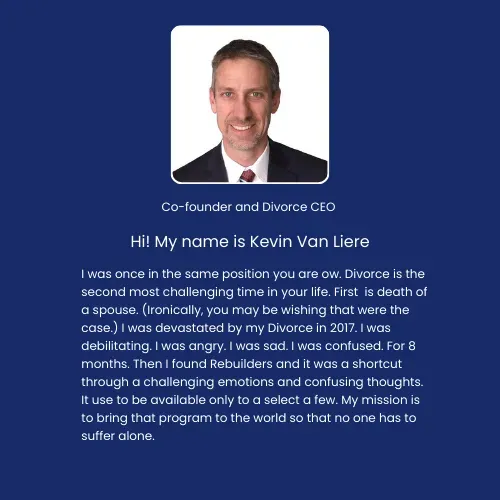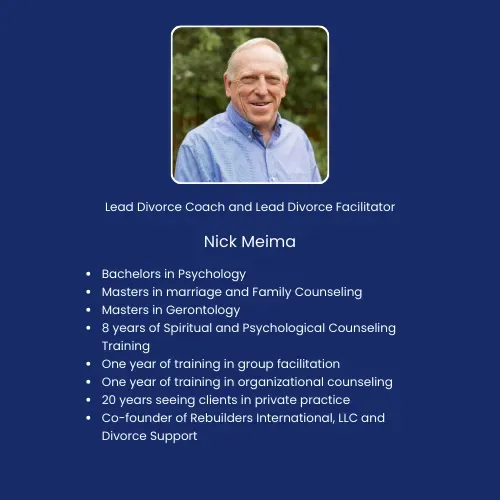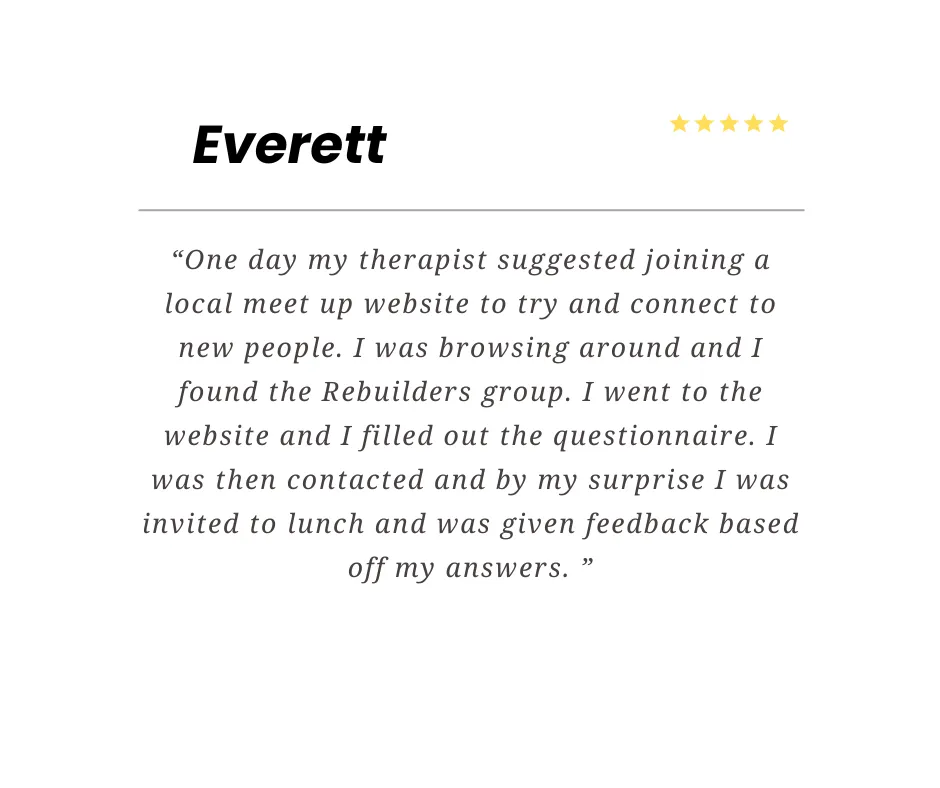FEATURED STORIES...
(Click on the images to open in a new tab)
Welcome to the #1 most comprehensive divorce recovery program in the world. For 40 years.
Is Divorce in your future?
In the Divorce Process?
Divorced?
THERE'S NO CIRCUMSTANCE OR SITUATION THAT WE CAN'T HELP WITH

A program that has been reliably operating
for over 40 years.

Featured on major news outlets like
The New York Times & NPR
Helping thousands of people with proven tools. Guaranteed.
Don't know where to start?
Your Journey Begins Here

Get an "Emotional Weather Report
Learn how you are doing in 6 key areas, plus get free, personalized training on how YOU can recover best!

Schedule a FREE 30-Minute Consult
Talk with an expert Divorce Coach about your situation, your results, and the best path forward for YOU.

Sign up for an introductory class
Learn more about the Rebuilders programs available to you that will fit your schedule and budget
Take the First Step Here
Our Courses and Services
10-WEEK
GROUP CLASSES
The Most Effective, Efficient and PROVEN System In The World, For Over 40 Years.
Group classes have proven to be the BEST method for recovery when dealing with divorce. Being able to connect with others in a similar situation is SO powerful and important!

Online Workshops
NEXT ONLINE CLASS STARTS:
Sunday Sept 14th at 3pm ET (noon PT)

Our Online Divorce Recovery Groups are 2 hours long, designed to focus on your healing journey. These Divorce Recovery Online sessions connect you with others in a supportive community, where skilled coaching guides you every step of the way.
In-Person Seminars
Divorce Recovery Workshops are offered in more than 20 locations worldwide, giving you access to in-person sessions.
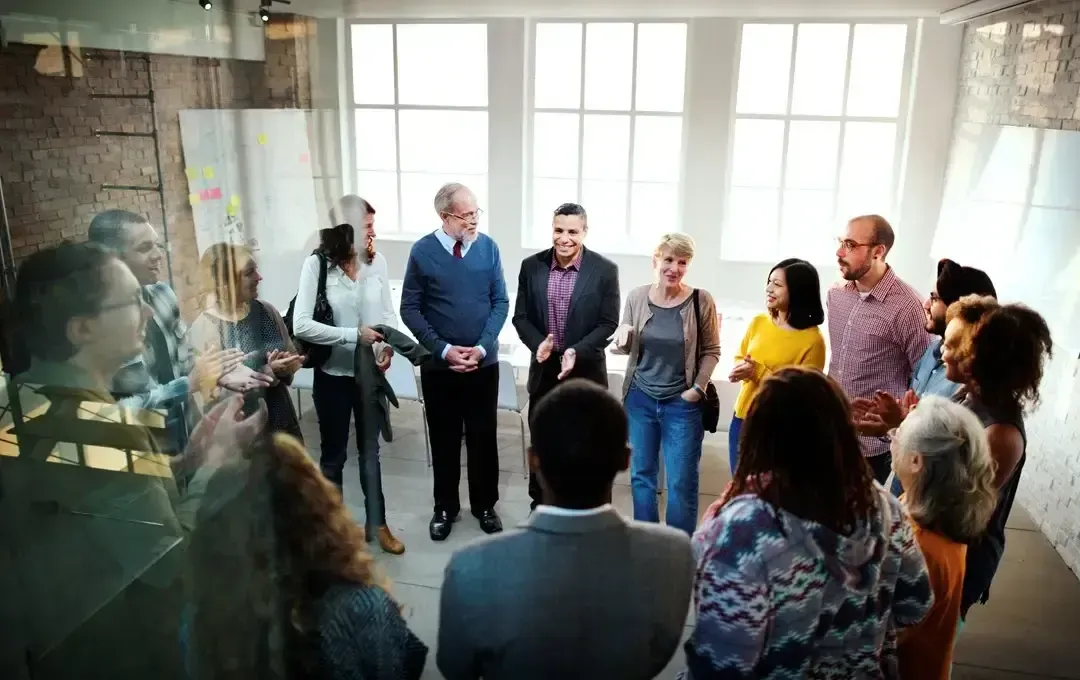
Local groups are also focused on recovery but they typically focus more on community and making connections locally. Join now to get the support you need!
FIND A SEMINAR NEAR YOU
Weekly Support Group
EVERY TUESDAY NIGHT
8-9:30pm Eastern (5-6:30 PT)

Our Divorce Group Sessions offer a safe and supportive environment, designed to help you heal and grow with others who understand your journey. Participate in these Divorce Recovery Workshops from the comfort of your own home.
PRIVATE COACHING
Your Situation Is Unique.
You Are Unique.
Group classes are tremendously helpful but we know that people also have some very difficult situations that they are dealing with. When working with a coach One-on-One you can dramatically accelerate the process and get guidance on YOUR situation in a focused, personalized process.
A lot of people try therapy as the deal with divorce. Many find that therapy does not give them the results that they are looking for. Coaching does.

E-COURSES
Do you have a busy schedule or tight budget?
We offer a variety of self paced programs in which you are guided step-by-step. You can focus on a particular area of recovery or get our proven 10 step recovery program. These courses will fit into any schedule and some you can get started for free. All come with a money back guarantee. You also have the option of adding private coaching as well.

4O Years Of Changing People's Lives.

MEET DR. BRUCE FISHER
The founder of the Rebuilders program was Dr. Bruce Fisher (1931-1998). He was born in Iowa but spent most of his adult life in Boulder, Colorado. He was a popular divorce therapist, author, teacher and a Clinical Member of the American Association for Marriage and Family Therapy. As he worked with clients dealing with divorce he realized that traditional therapy didn’t work efficiently.
He began working with his clients in groups and eventually found that there are 19 “steps” that people must work through to effectively “Rebuild” their lives. From this work he wrote the book “Rebuilding When Your Relationship Ends.” We still use this book as a reference in our classes. Since he wrote the book over 30 years ago we have learned a lot and the program has evolved considerably. Now we find that there are more “steps” and that there are some elements that Dr. Fisher wasn’t aware of or misunderstood. However, he still created a powerful foundation for the program that we run today.
This program continues to improve and it works.
We guarantee it.

Don't be alone!
Join us on social media and start your journey to rebuilding
How Our Program Works

Head
Your thinking, mindset, beliefs, and values all influence how you respond to the traumatic experience of divorce. We show you how to step outside of the rumination about the past. Learn to step outside of the normal traps that keep people stuck thinking about the past.

Heart
Many people suppress, depress, or repress their feelings. Divorce brings so many "difficult" feelings. We give you tools to work through them, use them, and feel the "good" feelings again - like HAPPINESS, JOY, AND LOVE.

Identity
In marriages people "lose" themselves. When the marriage ends they don't know who they are as a single person. We help you connect with yourself so that you can be comfortable being alone in your own skin.
Free Divorce Resources
Rebuilders is committed to helping EVERYONE, regardless of their financial situation.
The Program Works Regardless of Your Situation!
Is Divorce in your future?

Learn what you can do find the best path forward
It is a very difficult time in your life when you are facing the possibility of divorce. We offer a wide variety of tools, information and personal coaching to help you.

The Best Divorce Support Groups – The Complete Guide
DIVORCE SUPPORT GROUPS NEAR ME: Your Path to Healing and Recovery
Introduction: Navigating the Emotional Rollercoaster
Hey there, if you're reading this, chances are you or someone you know is going through a divorce. First off, let me say that I understand how incredibly tough this journey can be. I've seen countless individuals over the age of 35 struggle with the emotional toll of divorce. But here's the good news: you don't have to go through it alone.
The Emotional Toll of Divorce
Divorce can turn your world upside down. I've been through it myself, and I know firsthand how it can leave you feeling lost, hurt, and overwhelmed. The emotional rollercoaster of anger, sadness, and confusion can be paralyzing.
The Importance of Seeking Support
This is where divorce support groups come in. They are like lifelines in the stormy sea of divorce recovery. These groups offer a safe space for men and women to share their experiences, receive emotional support, and learn valuable coping strategies.
Understanding Divorce Support Groups
What Are Divorce Support Groups?
Divorce support groups are gatherings of individuals who have one common goal: to heal from the wounds of divorce. These groups can be in-person or online, and they provide a platform for sharing feelings, experiences, and advice.
I remember joining my first divorce support group. It was in a small community center, and the sense of relief I felt when I realized I wasn't alone in my struggles was incredible.
Different Types of Divorce Support Groups
Not all support groups are the same. The biggest factor in the quality of the group is whether the facilitator has mental health training or is a volunteer. Generally the ones run by volunteers at the local church are great for meeting others going through divorce but if you want to heal these are not the place to do it.
I also have found that there is a big difference between a Divorce Support Group and a Divorce Recovery Group. A support group near you might provide local connections such as good lawyers, therapists, financial advisors or realtors. Recovery groups are groups that have a curriculum and structure to the meetings and are focused on your emotional and mental transformation. Generally they start every few months and run for 8 to 10 weeks.
Also, there are a fair amount of Women’s Divorce Support Groups but generally men don’t call them “Support Groups”. It is more likely to find “Men’s Groups”. I think there is a place for both. Personally though I found that it was really helpful to be in a mixed group. I met a woman in the group that behaved similarly to my Ex-wife and I was able to talk to her about why she did what she did. It helped me see a different angle that I wasn’t able to with my Ex. Nevertheless, I think some people need a particular group such as women that were abused, LGBTQ+, or highly traumatic marriages.
Benefits of Joining a Divorce Support Group
Joining a divorce support group is not a sign of weakness; it's a smart move towards healing and recovery.
Emotional Support
One of the most significant benefits of these groups is the emotional support they provide. You can share your story without judgment, which can be incredibly cathartic.
Shared Experiences
I'll never forget the feeling of validation when someone in my group shared a similar experience. Knowing that others had walked the same path made me feel less isolated.
Building a Supportive Community
Over time, these groups can become like a second family. The connections you make can extend beyond the meetings, offering a network of people who truly understand what you're going through.
Finding the Right Divorce Support Group
Assessing Your Needs
Before diving into a group, take some time to assess your needs. What are your primary concerns? Are you looking for emotional support, a new community, or both?
Locating Local Divorce Support Groups
Finding a divorce support group near you is easier than you might think. You can start with online resources and directories or ask for recommendations from professionals like therapists or lawyers who specialize in divorce. To make it easier I’ve created a list below that can give you a head start.
Evaluating Group Compatibility
Not all support groups are the same, and group dynamics vary. It's crucial to find a group that fits your personality and comfort level. If you prefer a smaller, more intimate setting, look for that. If you want a larger group with diverse experiences, you can find that too.
Free or Paid?
People going through divorce rarely have lots of money to spare. Many have something after the finances have been settled out but when you need the support the most is when budgets are tight. Most support groups are very low cost, if not free. Nevertheless, you get what you pay for.
Also, keep in mind that joining a group that is run by a certified professional means that you are getting access to a highly qualified professional at a fraction of the cost. If you are struggling emotionally but can’t afford therapy, start with a support group. If you find that you like the group but need more then you can move up to a Divorce Recovery Group.
Online Options for Remote Participants
If you can't find a local group or prefer online interactions, don't worry; there are some really good virtual divorce support groups available. These provide flexibility, efficient use of your time, and can be just as effective in offering emotional support. Plus you can often see recordings from the group if the time doesn’t work for you.
Benefits of Joining a Divorce Support Group
Emotional Healing
Emotional healing is at the core of divorce recovery. By sharing your story and listening to others, you can start rebuilding your self-esteem and confidence.
Sharing Openly and Honestly
I remember the first time I shared my story in a group. It was scary, but it also felt liberating. The weight of my pain seemed a bit lighter after I had shared it with people who truly understood.
Coping Strategies
Learning from others' experiences and hearing about their coping mechanisms can be a game-changer. You can pick up practical strategies for managing stress and moving forward.
Developing Healthy Coping Mechanisms
In my group, I learned about boundaries, understanding trust, communication skills, plus mindfulness and meditation as tools to deal with stress. The information and techniques not only helped me during the divorce but continue to serve me well in life.
Practical Guidance
Divorce involves more than just emotions. It has legal and financial implications. Many support groups bring in professionals to offer legal advice and financial planning tips.
Co-Parenting Support
If you have children, co-parenting can be a tricky road to navigate. Support groups often offer valuable advice on effective communication with your ex and coordinating parenting schedules.
How to Make the Most of Your Divorce Support Group Experience
Joining a support group is a great first step, but making the most of it requires active participation and realistic expectations.
Active Participation
To benefit fully, share your thoughts and feelings openly and honestly. Don't be afraid to listen and offer support to others. It's a two-way street.
Setting Realistic Expectations
Remember, a support group is designed to provide community and support. It is not where you should expect to get the tools you need to heal.
I talk to a lot of people that do our Recovery program after doing a popular 13-week program that is in many churches. They didn’t get the healing they hoped for. They are still struggling, looking to recover. The content is focused on encouraging them to join the church rather than healing.
Utilizing Resources
Most support groups offer educational materials or suggestions for good materials. Take advantage of these resources. They can provide valuable insights and tools for healing.
Seeking Professional Help When Needed
While support groups help address loneliness and shame there are situations when you need individual work. Ideally the person running the group is qualified to do individual work as well. Then you get the group and individual experience that combine for the healing result you are looking for.
My biggest recommendation is to look for a professional that has been divorced themselves AND focuses on divorce recovery. Many therapists are trained to keep couples together. Those skills don’t transfer to actually dealing with the heartbreak.
Testimonials and Success Stories
To give you a taste of what's possible, here are some personal accounts of individuals who found healing through support groups:
Samantha, 40
"When I joined my divorce support group, I was so lonely. Having a group of people to talk to that understood how hard divorce is was my lifeline. "
John, 45
"I was lost. Completely lost. I heard other people’s stories and it gave me perspective. I also was able to see that though my situation was hard it could have been worse, much worse. It gave me incentive to do everything I could to keep the split as friendly as possible."
You can actually listen to people describing their transformation here.
Conclusion: Finding Hope and Healing Through Community Support
In the midst of the chaos that divorce can bring, support groups offer a lifeline to healing. Whether you're seeking emotional support, practical advice, or just a safe place to share your feelings, there's a support group out there for you.
Remember, you don't have to go through this alone. By taking that first step and seeking out a divorce support group near you, you're already on the path to healing and recovery.
List of Best Divorce Support Groups
Rebuilders offers both local and online support groups AND Recovery groups. The facilitators are all highly trained and able to handle a wide variety of issues. Many of the support groups are free. Participants can often join local activities as well as do the deep recovery work needed to really let go of the intense feelings so that they can move on.
CirclesUp
Circles groups are led by mental health professionals. The $79 monthly fee is not covered by insurance, but financial assistance is available. In my experience the facilitators are not specifically focused on divorce. They fill their groups as much as possible and even though I asked for a divorce support group there were people that were not actually going through divorce.
DivorceCare
This program is offered in many churches. Often it costs $25 to $50 to join. The program is 13 weeks long and is led by a volunteer. There is no training required to be a facilitator for a program. The format is supposed to be that participants watch videos by “experts” on the topic of the week. The problem with this format is that there is no cohesive information. Each week a new topic is discussed but it doesn’t relate to the previous week, nor does it build on earlier information. Also, every week participants are reminded that they shouldn’t be divorcing in the eyes of God and that they should join the church to find true healing. The quality of the program varies from church to church.I like that they are in a lot of locations. Having a community of people going through divorce can be very helpful.
MeetUp
MeetUp.com is a fantastic website for finding activities near you. You can find activities that interest you and get you out of the house. You can also find divorce support groups here. Some of these groups have online meetings as well as local activities. Plus they bring in experts that can help explain the legal and financial process in your area. Similarly to DivorceCare the group quality really depends on the leader. If you don’t like one look for another as there are a lot of groups on MeetUp!
Conclusion
No matter what you do, do something. Divorce is fundamentally so isolating and often leaves people feeling very alone and ashamed. By reaching out to others you will get support and humanity you deserve.
In the Divorce Process?

Divorce Resources – Support for All Stages of Divorce
When you are dealing with divorce there is a lot going on. There are legal issues, financial issues, emotional issues, parenting issues and more. When faced with all of these pressures we see that people that pay attention to the emotional effect of divorce are better able to navigate everything else much better.

The Best Divorce Support Groups – The Complete Guide
DIVORCE SUPPORT GROUPS NEAR ME: Your Path to Healing and Recovery
Introduction: Navigating the Emotional Rollercoaster
Hey there, if you're reading this, chances are you or someone you know is going through a divorce. First off, let me say that I understand how incredibly tough this journey can be. I've seen countless individuals over the age of 35 struggle with the emotional toll of divorce. But here's the good news: you don't have to go through it alone.
The Emotional Toll of Divorce
Divorce can turn your world upside down. I've been through it myself, and I know firsthand how it can leave you feeling lost, hurt, and overwhelmed. The emotional rollercoaster of anger, sadness, and confusion can be paralyzing.
The Importance of Seeking Support
This is where divorce support groups come in. They are like lifelines in the stormy sea of divorce recovery. These groups offer a safe space for men and women to share their experiences, receive emotional support, and learn valuable coping strategies.
Understanding Divorce Support Groups
What Are Divorce Support Groups?
Divorce support groups are gatherings of individuals who have one common goal: to heal from the wounds of divorce. These groups can be in-person or online, and they provide a platform for sharing feelings, experiences, and advice.
I remember joining my first divorce support group. It was in a small community center, and the sense of relief I felt when I realized I wasn't alone in my struggles was incredible.
Different Types of Divorce Support Groups
Not all support groups are the same. The biggest factor in the quality of the group is whether the facilitator has mental health training or is a volunteer. Generally the ones run by volunteers at the local church are great for meeting others going through divorce but if you want to heal these are not the place to do it.
I also have found that there is a big difference between a Divorce Support Group and a Divorce Recovery Group. A support group near you might provide local connections such as good lawyers, therapists, financial advisors or realtors. Recovery groups are groups that have a curriculum and structure to the meetings and are focused on your emotional and mental transformation. Generally they start every few months and run for 8 to 10 weeks.
Also, there are a fair amount of Women’s Divorce Support Groups but generally men don’t call them “Support Groups”. It is more likely to find “Men’s Groups”. I think there is a place for both. Personally though I found that it was really helpful to be in a mixed group. I met a woman in the group that behaved similarly to my Ex-wife and I was able to talk to her about why she did what she did. It helped me see a different angle that I wasn’t able to with my Ex. Nevertheless, I think some people need a particular group such as women that were abused, LGBTQ+, or highly traumatic marriages.
Benefits of Joining a Divorce Support Group
Joining a divorce support group is not a sign of weakness; it's a smart move towards healing and recovery.
Emotional Support
One of the most significant benefits of these groups is the emotional support they provide. You can share your story without judgment, which can be incredibly cathartic.
Shared Experiences
I'll never forget the feeling of validation when someone in my group shared a similar experience. Knowing that others had walked the same path made me feel less isolated.
Building a Supportive Community
Over time, these groups can become like a second family. The connections you make can extend beyond the meetings, offering a network of people who truly understand what you're going through.
Finding the Right Divorce Support Group
Assessing Your Needs
Before diving into a group, take some time to assess your needs. What are your primary concerns? Are you looking for emotional support, a new community, or both?
Locating Local Divorce Support Groups
Finding a divorce support group near you is easier than you might think. You can start with online resources and directories or ask for recommendations from professionals like therapists or lawyers who specialize in divorce. To make it easier I’ve created a list below that can give you a head start.
Evaluating Group Compatibility
Not all support groups are the same, and group dynamics vary. It's crucial to find a group that fits your personality and comfort level. If you prefer a smaller, more intimate setting, look for that. If you want a larger group with diverse experiences, you can find that too.
Free or Paid?
People going through divorce rarely have lots of money to spare. Many have something after the finances have been settled out but when you need the support the most is when budgets are tight. Most support groups are very low cost, if not free. Nevertheless, you get what you pay for.
Also, keep in mind that joining a group that is run by a certified professional means that you are getting access to a highly qualified professional at a fraction of the cost. If you are struggling emotionally but can’t afford therapy, start with a support group. If you find that you like the group but need more then you can move up to a Divorce Recovery Group.
Online Options for Remote Participants
If you can't find a local group or prefer online interactions, don't worry; there are some really good virtual divorce support groups available. These provide flexibility, efficient use of your time, and can be just as effective in offering emotional support. Plus you can often see recordings from the group if the time doesn’t work for you.
Benefits of Joining a Divorce Support Group
Emotional Healing
Emotional healing is at the core of divorce recovery. By sharing your story and listening to others, you can start rebuilding your self-esteem and confidence.
Sharing Openly and Honestly
I remember the first time I shared my story in a group. It was scary, but it also felt liberating. The weight of my pain seemed a bit lighter after I had shared it with people who truly understood.
Coping Strategies
Learning from others' experiences and hearing about their coping mechanisms can be a game-changer. You can pick up practical strategies for managing stress and moving forward.
Developing Healthy Coping Mechanisms
In my group, I learned about boundaries, understanding trust, communication skills, plus mindfulness and meditation as tools to deal with stress. The information and techniques not only helped me during the divorce but continue to serve me well in life.
Practical Guidance
Divorce involves more than just emotions. It has legal and financial implications. Many support groups bring in professionals to offer legal advice and financial planning tips.
Co-Parenting Support
If you have children, co-parenting can be a tricky road to navigate. Support groups often offer valuable advice on effective communication with your ex and coordinating parenting schedules.
How to Make the Most of Your Divorce Support Group Experience
Joining a support group is a great first step, but making the most of it requires active participation and realistic expectations.
Active Participation
To benefit fully, share your thoughts and feelings openly and honestly. Don't be afraid to listen and offer support to others. It's a two-way street.
Setting Realistic Expectations
Remember, a support group is designed to provide community and support. It is not where you should expect to get the tools you need to heal.
I talk to a lot of people that do our Recovery program after doing a popular 13-week program that is in many churches. They didn’t get the healing they hoped for. They are still struggling, looking to recover. The content is focused on encouraging them to join the church rather than healing.
Utilizing Resources
Most support groups offer educational materials or suggestions for good materials. Take advantage of these resources. They can provide valuable insights and tools for healing.
Seeking Professional Help When Needed
While support groups help address loneliness and shame there are situations when you need individual work. Ideally the person running the group is qualified to do individual work as well. Then you get the group and individual experience that combine for the healing result you are looking for.
My biggest recommendation is to look for a professional that has been divorced themselves AND focuses on divorce recovery. Many therapists are trained to keep couples together. Those skills don’t transfer to actually dealing with the heartbreak.
Testimonials and Success Stories
To give you a taste of what's possible, here are some personal accounts of individuals who found healing through support groups:
Samantha, 40
"When I joined my divorce support group, I was so lonely. Having a group of people to talk to that understood how hard divorce is was my lifeline. "
John, 45
"I was lost. Completely lost. I heard other people’s stories and it gave me perspective. I also was able to see that though my situation was hard it could have been worse, much worse. It gave me incentive to do everything I could to keep the split as friendly as possible."
You can actually listen to people describing their transformation here.
Conclusion: Finding Hope and Healing Through Community Support
In the midst of the chaos that divorce can bring, support groups offer a lifeline to healing. Whether you're seeking emotional support, practical advice, or just a safe place to share your feelings, there's a support group out there for you.
Remember, you don't have to go through this alone. By taking that first step and seeking out a divorce support group near you, you're already on the path to healing and recovery.
List of Best Divorce Support Groups
Rebuilders offers both local and online support groups AND Recovery groups. The facilitators are all highly trained and able to handle a wide variety of issues. Many of the support groups are free. Participants can often join local activities as well as do the deep recovery work needed to really let go of the intense feelings so that they can move on.
CirclesUp
Circles groups are led by mental health professionals. The $79 monthly fee is not covered by insurance, but financial assistance is available. In my experience the facilitators are not specifically focused on divorce. They fill their groups as much as possible and even though I asked for a divorce support group there were people that were not actually going through divorce.
DivorceCare
This program is offered in many churches. Often it costs $25 to $50 to join. The program is 13 weeks long and is led by a volunteer. There is no training required to be a facilitator for a program. The format is supposed to be that participants watch videos by “experts” on the topic of the week. The problem with this format is that there is no cohesive information. Each week a new topic is discussed but it doesn’t relate to the previous week, nor does it build on earlier information. Also, every week participants are reminded that they shouldn’t be divorcing in the eyes of God and that they should join the church to find true healing. The quality of the program varies from church to church.I like that they are in a lot of locations. Having a community of people going through divorce can be very helpful.
MeetUp
MeetUp.com is a fantastic website for finding activities near you. You can find activities that interest you and get you out of the house. You can also find divorce support groups here. Some of these groups have online meetings as well as local activities. Plus they bring in experts that can help explain the legal and financial process in your area. Similarly to DivorceCare the group quality really depends on the leader. If you don’t like one look for another as there are a lot of groups on MeetUp!
Conclusion
No matter what you do, do something. Divorce is fundamentally so isolating and often leaves people feeling very alone and ashamed. By reaching out to others you will get support and humanity you deserve.
Divorced?

The Papers are signed...
Whether you are recently divorced or it has been years, the wounds from divorce are real. Time does not heal all wounds, it just scabs over them. So if you are ready to learn more about what you can do to HEAL then click below.

The Best Divorce Support Groups – The Complete Guide
DIVORCE SUPPORT GROUPS NEAR ME: Your Path to Healing and Recovery
Introduction: Navigating the Emotional Rollercoaster
Hey there, if you're reading this, chances are you or someone you know is going through a divorce. First off, let me say that I understand how incredibly tough this journey can be. I've seen countless individuals over the age of 35 struggle with the emotional toll of divorce. But here's the good news: you don't have to go through it alone.
The Emotional Toll of Divorce
Divorce can turn your world upside down. I've been through it myself, and I know firsthand how it can leave you feeling lost, hurt, and overwhelmed. The emotional rollercoaster of anger, sadness, and confusion can be paralyzing.
The Importance of Seeking Support
This is where divorce support groups come in. They are like lifelines in the stormy sea of divorce recovery. These groups offer a safe space for men and women to share their experiences, receive emotional support, and learn valuable coping strategies.
Understanding Divorce Support Groups
What Are Divorce Support Groups?
Divorce support groups are gatherings of individuals who have one common goal: to heal from the wounds of divorce. These groups can be in-person or online, and they provide a platform for sharing feelings, experiences, and advice.
I remember joining my first divorce support group. It was in a small community center, and the sense of relief I felt when I realized I wasn't alone in my struggles was incredible.
Different Types of Divorce Support Groups
Not all support groups are the same. The biggest factor in the quality of the group is whether the facilitator has mental health training or is a volunteer. Generally the ones run by volunteers at the local church are great for meeting others going through divorce but if you want to heal these are not the place to do it.
I also have found that there is a big difference between a Divorce Support Group and a Divorce Recovery Group. A support group near you might provide local connections such as good lawyers, therapists, financial advisors or realtors. Recovery groups are groups that have a curriculum and structure to the meetings and are focused on your emotional and mental transformation. Generally they start every few months and run for 8 to 10 weeks.
Also, there are a fair amount of Women’s Divorce Support Groups but generally men don’t call them “Support Groups”. It is more likely to find “Men’s Groups”. I think there is a place for both. Personally though I found that it was really helpful to be in a mixed group. I met a woman in the group that behaved similarly to my Ex-wife and I was able to talk to her about why she did what she did. It helped me see a different angle that I wasn’t able to with my Ex. Nevertheless, I think some people need a particular group such as women that were abused, LGBTQ+, or highly traumatic marriages.
Benefits of Joining a Divorce Support Group
Joining a divorce support group is not a sign of weakness; it's a smart move towards healing and recovery.
Emotional Support
One of the most significant benefits of these groups is the emotional support they provide. You can share your story without judgment, which can be incredibly cathartic.
Shared Experiences
I'll never forget the feeling of validation when someone in my group shared a similar experience. Knowing that others had walked the same path made me feel less isolated.
Building a Supportive Community
Over time, these groups can become like a second family. The connections you make can extend beyond the meetings, offering a network of people who truly understand what you're going through.
Finding the Right Divorce Support Group
Assessing Your Needs
Before diving into a group, take some time to assess your needs. What are your primary concerns? Are you looking for emotional support, a new community, or both?
Locating Local Divorce Support Groups
Finding a divorce support group near you is easier than you might think. You can start with online resources and directories or ask for recommendations from professionals like therapists or lawyers who specialize in divorce. To make it easier I’ve created a list below that can give you a head start.
Evaluating Group Compatibility
Not all support groups are the same, and group dynamics vary. It's crucial to find a group that fits your personality and comfort level. If you prefer a smaller, more intimate setting, look for that. If you want a larger group with diverse experiences, you can find that too.
Free or Paid?
People going through divorce rarely have lots of money to spare. Many have something after the finances have been settled out but when you need the support the most is when budgets are tight. Most support groups are very low cost, if not free. Nevertheless, you get what you pay for.
Also, keep in mind that joining a group that is run by a certified professional means that you are getting access to a highly qualified professional at a fraction of the cost. If you are struggling emotionally but can’t afford therapy, start with a support group. If you find that you like the group but need more then you can move up to a Divorce Recovery Group.
Online Options for Remote Participants
If you can't find a local group or prefer online interactions, don't worry; there are some really good virtual divorce support groups available. These provide flexibility, efficient use of your time, and can be just as effective in offering emotional support. Plus you can often see recordings from the group if the time doesn’t work for you.
Benefits of Joining a Divorce Support Group
Emotional Healing
Emotional healing is at the core of divorce recovery. By sharing your story and listening to others, you can start rebuilding your self-esteem and confidence.
Sharing Openly and Honestly
I remember the first time I shared my story in a group. It was scary, but it also felt liberating. The weight of my pain seemed a bit lighter after I had shared it with people who truly understood.
Coping Strategies
Learning from others' experiences and hearing about their coping mechanisms can be a game-changer. You can pick up practical strategies for managing stress and moving forward.
Developing Healthy Coping Mechanisms
In my group, I learned about boundaries, understanding trust, communication skills, plus mindfulness and meditation as tools to deal with stress. The information and techniques not only helped me during the divorce but continue to serve me well in life.
Practical Guidance
Divorce involves more than just emotions. It has legal and financial implications. Many support groups bring in professionals to offer legal advice and financial planning tips.
Co-Parenting Support
If you have children, co-parenting can be a tricky road to navigate. Support groups often offer valuable advice on effective communication with your ex and coordinating parenting schedules.
How to Make the Most of Your Divorce Support Group Experience
Joining a support group is a great first step, but making the most of it requires active participation and realistic expectations.
Active Participation
To benefit fully, share your thoughts and feelings openly and honestly. Don't be afraid to listen and offer support to others. It's a two-way street.
Setting Realistic Expectations
Remember, a support group is designed to provide community and support. It is not where you should expect to get the tools you need to heal.
I talk to a lot of people that do our Recovery program after doing a popular 13-week program that is in many churches. They didn’t get the healing they hoped for. They are still struggling, looking to recover. The content is focused on encouraging them to join the church rather than healing.
Utilizing Resources
Most support groups offer educational materials or suggestions for good materials. Take advantage of these resources. They can provide valuable insights and tools for healing.
Seeking Professional Help When Needed
While support groups help address loneliness and shame there are situations when you need individual work. Ideally the person running the group is qualified to do individual work as well. Then you get the group and individual experience that combine for the healing result you are looking for.
My biggest recommendation is to look for a professional that has been divorced themselves AND focuses on divorce recovery. Many therapists are trained to keep couples together. Those skills don’t transfer to actually dealing with the heartbreak.
Testimonials and Success Stories
To give you a taste of what's possible, here are some personal accounts of individuals who found healing through support groups:
Samantha, 40
"When I joined my divorce support group, I was so lonely. Having a group of people to talk to that understood how hard divorce is was my lifeline. "
John, 45
"I was lost. Completely lost. I heard other people’s stories and it gave me perspective. I also was able to see that though my situation was hard it could have been worse, much worse. It gave me incentive to do everything I could to keep the split as friendly as possible."
You can actually listen to people describing their transformation here.
Conclusion: Finding Hope and Healing Through Community Support
In the midst of the chaos that divorce can bring, support groups offer a lifeline to healing. Whether you're seeking emotional support, practical advice, or just a safe place to share your feelings, there's a support group out there for you.
Remember, you don't have to go through this alone. By taking that first step and seeking out a divorce support group near you, you're already on the path to healing and recovery.
List of Best Divorce Support Groups
Rebuilders offers both local and online support groups AND Recovery groups. The facilitators are all highly trained and able to handle a wide variety of issues. Many of the support groups are free. Participants can often join local activities as well as do the deep recovery work needed to really let go of the intense feelings so that they can move on.
CirclesUp
Circles groups are led by mental health professionals. The $79 monthly fee is not covered by insurance, but financial assistance is available. In my experience the facilitators are not specifically focused on divorce. They fill their groups as much as possible and even though I asked for a divorce support group there were people that were not actually going through divorce.
DivorceCare
This program is offered in many churches. Often it costs $25 to $50 to join. The program is 13 weeks long and is led by a volunteer. There is no training required to be a facilitator for a program. The format is supposed to be that participants watch videos by “experts” on the topic of the week. The problem with this format is that there is no cohesive information. Each week a new topic is discussed but it doesn’t relate to the previous week, nor does it build on earlier information. Also, every week participants are reminded that they shouldn’t be divorcing in the eyes of God and that they should join the church to find true healing. The quality of the program varies from church to church.I like that they are in a lot of locations. Having a community of people going through divorce can be very helpful.
MeetUp
MeetUp.com is a fantastic website for finding activities near you. You can find activities that interest you and get you out of the house. You can also find divorce support groups here. Some of these groups have online meetings as well as local activities. Plus they bring in experts that can help explain the legal and financial process in your area. Similarly to DivorceCare the group quality really depends on the leader. If you don’t like one look for another as there are a lot of groups on MeetUp!
Conclusion
No matter what you do, do something. Divorce is fundamentally so isolating and often leaves people feeling very alone and ashamed. By reaching out to others you will get support and humanity you deserve.
Join our private online community.
Divorce Support Hub
Get the support you need through our Divorce Recovery Classes, designed to help you navigate the challenges of this emotional journey.
I'll guide you on a personalized path to recovery with our Divorce Recovery Sessions, so you can make empowered decisions during this difficult time in your life.

Kevin Van Liere
Expert Divorce Coach
Frequently Asked Questions
How much do the Divorce Recovery Sessions cost?
The cost varies based on the type of service you choose, from Online Divorce Recovery sessions to in-person Divorce Recovery Workshops. Get the support that fits your needs and budget. The 10-week programs investment is generally at least $300 up to $1200.
The eCourses we offer are all less than $250 and some are free.
The support group is free to join.
The self test is completely free as well as the 30-minute Clarity Call with a Divorce Coach.
Where is the closest Divorce Recovery Workshop or Divorce Group Session near me?
You will need to enter your zip code to get the closest location to you. We are constantly adding locations and this is free and the fastest way for us to locate a program near you.
Go to this page and we will look up the program closest to you: https://rebuilders.net/locations
When is the next class?
Online classes start every 2 to 3 weeks. In person (local) classes generally start every 3 months (4 times per year). If you find a location close to you we will send you to a webpage that will have the class schedule listed. To do this, click here to find a local program: https://rebuilders.net/locations
The next online class starts: Sunday Sept 14th at 3pm ET (noon PT)

Copyright © 2025 Rebuilders International, LLC, All rights reserved.


